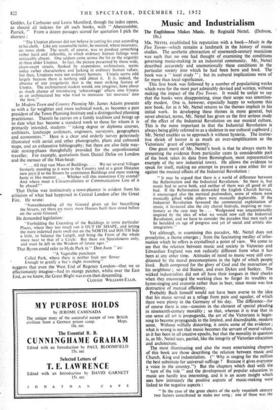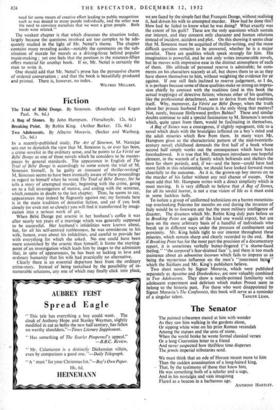Music and Industrialism MR. NETFEL established his reputation with a
book—Music in the Five Towns—which remains a landmark in the history of music studies. The aesthetic abstraction of nineteenth-century musicians was such that no one had thought of examining the conditions governing music-making in an industrial community. Mr., Nettel described accurately and unemotionally these conditions in the particular society into which he had been born and bred. The book was a " local study " ; but its cultural implications were of far more than local significance.
This first book was followed by a number of popularising works which were for the most part admirably devised and written, without malcing the impact of the Five Towns. It would be unfair to say that the books were disappointing, since their scope was intention- ally modest. One is, however, especially happy to welcome this new book, for in it Mr. Nettel returns to the themes implicit in his initial work. In developing these themes in more general, but never abstract, terms, Mr. Nettel has given us the first serious study of the effect of the Industrial Revolution on our musical culture. This is the more important in that the Industrial Revolution is always being glibly referred to as a skeleton in our cultural cupboard ; Mr. Nettel enables us to approach it without hysteria. The instinc- tive shriek of horror is as much an over-simplification as the Victorians' grunt of complacency.
One great merit of Mr. Nettel's book is that he always starts by presenting the evidence from particular cases (a considerable part of the book takes its data from Birmingham, most representative example of the new industrial town). He allows the evidence to speak for itself, making no attempt to present a case either for or against the musical effects of the Industrial Revolution : " It may be argued that there is a world of difference between the Reformation and the Industrial Revolution.— So there is, but music had to serve both, and neither of them was all good or all bad. If the Reformation demanded the English Church Service, it encouraged also the metrical psalmodists, some of whom were musically gifted while others were musically deplorable. If the Industrial Revolution favoured the commercial exploitation of music, it favoured also the city choral festivals, inspiring or reac- tionary as the case may be.... Wedgwood was unquestionably inspired by the idea of what we would now call the Industrial Revolution, and we have to consider the paradox that men such as he heralded an age of progress and yet of social and artistic dis- integration. "
Yet although, in examining this paradox, Mr. Nettel does not proselytise, a theme emerges ; from the fascinating medley of infor- mation which he offers is crystallised a point of view. We come to see that the relation between music and society in Victorian and Edwardian England was not radically different from what it has been at any other time. Attitudes of mind to music were still con- ditioned by the moral preconceptions in the light of which people lived. Bach composed for the glory of God and the instruction of his neighbour ; so did Stainer, and even .Dykes and Sankey. The wicked industrialists did not all have their tongues in their cheeks when they encouraged the working class to forget its troubles in hymn-singing and oratorio rather than in beer, since music was less destructive of manual efficiency.
Probably Bach himself would not have been averse to the idea that his music served as a refuge from pain and squalor, of which there were plenty in the Germany of his day. The difference—for of course there is one—consists in the element of special pleading in nineteenth-century morality so that, whereas it is true that in one sense all art is propaganda, the art of the Victorians is begin- ning to become propaganda in the limited, and discreditable, modern sense. Without wilfully distorting, it omits some of the evidence ; what is wrong is not that music becomes the servant of moral values, as it has been in all creative epochs, but that the morality in question is, as Mr. Nettel says, partial, like the integrity of Victorian edudation and architecture.
The most illuminating and also the most entertaining chapters of this book are those describing the relation between music and Church, King and industrialists. (" Why is singing for the million the best substitute for universal suffrage ? Because it gives everyone a voice in the country.") But the chapters which deal with the " turn of the tide " and the development of popular education in music are hardly less interesting, and it is an acute insight which sees how intimately the positive aspects of music-making were linked to the negative aspects : " In the case of the great choirs of the early twentieth century two factors contributed to make our song ; one of these was the
need for some means of creative effort leading to public recognition such as was denied to many people individually, and the other was the need to convince ourselves that we were a great people. Both needs were related."
The weakest chapter is that which discusses the situation today, largely because the questions involved are too complex to be ade- quately studied in the light of Mr. Nettel's theme. The chapter contains many revealing asides—notably the comments on the sub- stitution of morale for morals as a driving-force behind popular music,making ; yet one feels that the position in the nineteen-fifties offers material for another book. If so, Mr. Nettel is certainly the man to write it.
One should add that Mr. Nettel's prose has the persuasive charm of ordered conversation ; and that the book is beautifully produced and printed. There is, however, no index.
WILFRID MELLERS.



































 Previous page
Previous page